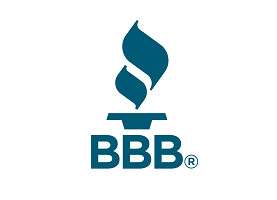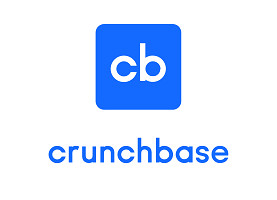Contractor SEO: Our Local SEO Guide Revealed
Do you want to learn the exact SEO strategies to rank your contractor website at the top of your local Google search results?
We’ve learned what works best for contractors through experience (we’ve been in the SEO industry for 15+ years and have generated thousands of leads) – we know how to rank your website in Google!
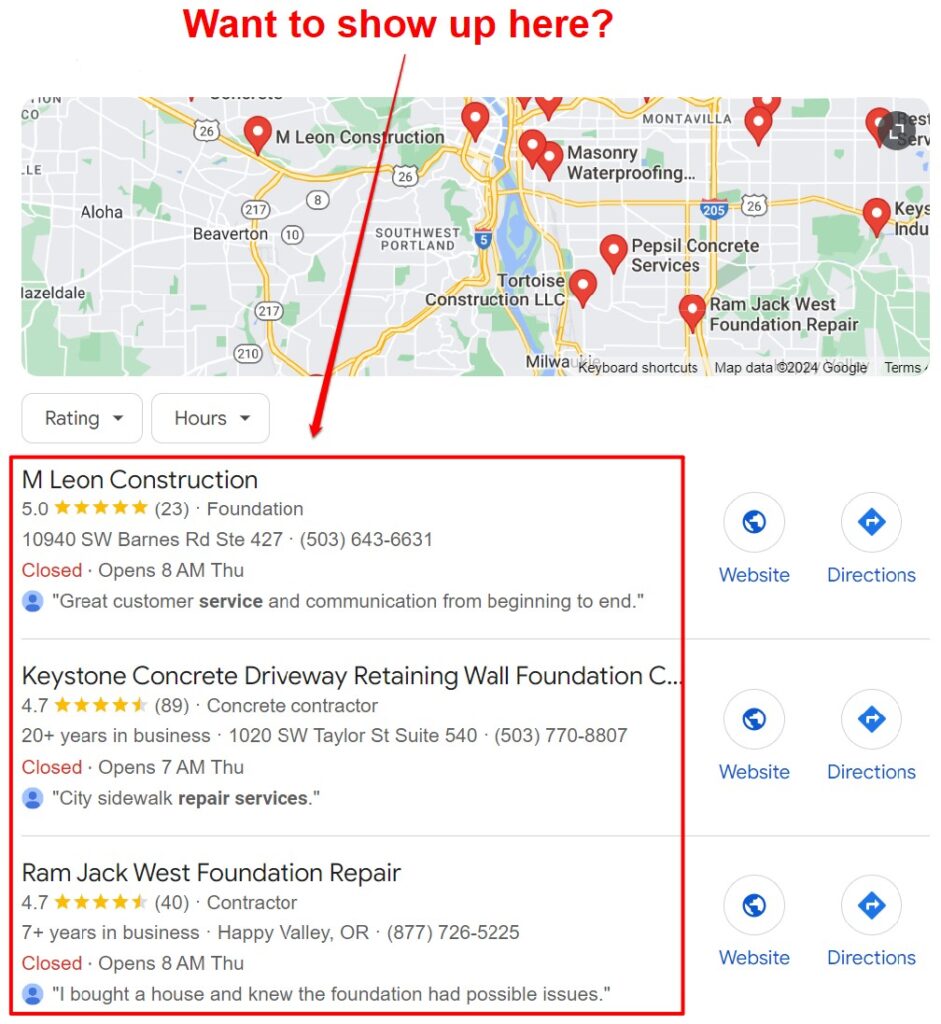
Learn How To Rank Your Contractor Website Using Our SEO Guide
Our Contractor SEO Guide will show you the steps to rank your contracting website at the top of Google search results.
From our exact SEO blueprint, you’ll learn:
- How to rank your website in Google Map results and in Google organic search results
- Generate far more search traffic and new phone calls to your business
- Steadily (and quickly) grow your business to new heights and build out your team
Page Contents
- Learn How To Rank Your Contractor Website Using Our SEO Guide
- Understanding The Basics of Local SEO for Contractors…
- Deeper Dive: Key Ranking Factors of a Successful Contractor SEO Strategy
- 1. How do you do Keyword Research for Contractor SEO?
- 2. Content Marketing for Contractors: Building your website into an Authority
- 3. Importance of On-Page SEO Optimization for Local Contractors
- 4. Local SEO for Contracting Companies
- Claim and Verify Your Listing
- Complete All Relevant Sections
- Add High-Quality Photos
- Encourage Satisfied Customers to Leave Reviews
- Regularly Post Updates and Special Offers
- Create Listings on Other Local Citation Websites
- Maintain Consistent NAP Information
- Optimize for Local Keywords
- Monitor and Analyze Your Performance
- Conclusion
- 5. SEO Link Building for Contractors
- 6. Monitoring and Adjusting Your Contractor SEO Results Over Time
- What Our Clients Say About Us
Understanding The Basics of Local SEO for Contractors…
Search Engine Optimization (SEO) is the process of making your website more authoritative so that it shows up higher in search results on Google and other search engines. There’s a lot that goes into a SEO campaign, including improving your website, adding more content, improving your web presence, and more.
The goal is to increase overall visibility in Search Engine Results Pages (SERPs) for high-value keywords so your website is ranking at the top of search results on Google, Bing and Yahoo when your potential customers search for businesses like yours.
The expected results of a well thought out local SEO campaign are more visitors to your website and more people contacting and hiring you.
When your site ranks higher in search results, more people see it and click on it, and contact you. Over time, this means you can get more phone calls, emails, and new customers.
Local SEO takes time to work, but with regular updates and improvements, your website can stay high in the search rankings and keep bringing in new business year after year.
By implementing the local SEO strategies laid out in this comprehensive guide, and other digital marketing strategies, you can start to attract more qualified contractor leads to grow your business!
The Importance of Contractor SEO
Investing in a long-term SEO plan is absolutely critical for any contractor business that is looking to stay competitive in their service area – whether it’s SEO for a foundation repair company, SEO for a basement waterproofing company or SEO for a roofing company, for all it’s incredibly important to start and maintain!
Here’s why SEO is especially important for a contracting business:
| Benefit | Description |
|---|---|
| Increased visibility | Local SEO helps your website rank higher in search results, making it easier for potential customers to find you. |
| Targeted traffic | By optimizing for relevant keywords, you attract visitors who are actively searching for foundation repair and basement waterproofing services. |
| More leads and conversions | Higher rankings and targeted traffic lead to more qualified leads and increased conversions. |
| Improved credibility | Appearing at the top of search results establishes your company as an authority in your industry. |
While any local SEO campaign requires a substantial investment of time upfront and over the entire course of the SEO campaign, SEO generates the highest ROI when compared to all the different online advertising opportunities available – both paid methods like Google AdWords, where it’s pay-to-play, and unpaid methods, such as TikTok or other social media platforms.
The businesses that recognize the long-term benefits always make SEO the top priority so they can substantially grow their new customer base over the medium- and long-term.
If a business isn’t “top of mind” in their local community (e.g. they do mailers, radio ads, etc…), they know their future customers will go directly to Google before they contact any contractor for help with their project.
A proven and properly implemented local SEO strategy can get your company to outrank your competitors, build your brand, generate far more leads, and ultimately get you to dominate your local market!
Understanding Google Search Results
Each city is a little bit different in how Google handles SERPs for local businesses.
In more competitive markets, Google will add additional ways that potential customers can find a business – including options for both paid results and organic results.
This can be broken up into as many as six different types of distinct search results.
Below are the current descriptions of all different types of SERPs – below that is a recent example from Houston, one of the largest markets for Foundation Repair services, which shows all of these results in action:
- Google Guaranteed Ads are contractors that have gone through an in-house Google Certification process to be granted access to a special advertising program – they are already spend money through Google AdWords, and go through a more extensive certification process than Google Local Services Ads.
- Google Local Services Ads are shown below the Google Certified Ads, this provider goes through less requirements than the first spot, which is the Google Guaranteed Ads.
- Google AdWords listings typically appear above the Maps listings and organic search results, allowing businesses to pay for ad placement based on selected keywords.
- Google Maps listings, also known as the 3-pack, are crucial for local searches and can be a significant lead generator for roofing companies. There are a few items that help listings rank, including a complete profile and great reviews. In smaller markets, there can still be a “paid” ad at the top of these results – since these markets might not have implemented Google Certified and Local Services Ads yet.
- Rich Snippets (“People Also Ask”) are part of the organic search results, and are a part of Google’s drive to increase the value of having people’s real input integrated into results to drive greater value for searchers – which is why we see results from communities, e.g. Reddit, Quora, BiggerPockets, in the organic search results below
- Organic Search Listings display underneath the maps listings for local searches. While their importance has decreased over time due to being pushed down the page, they still play a vital role in attracting potential customers.
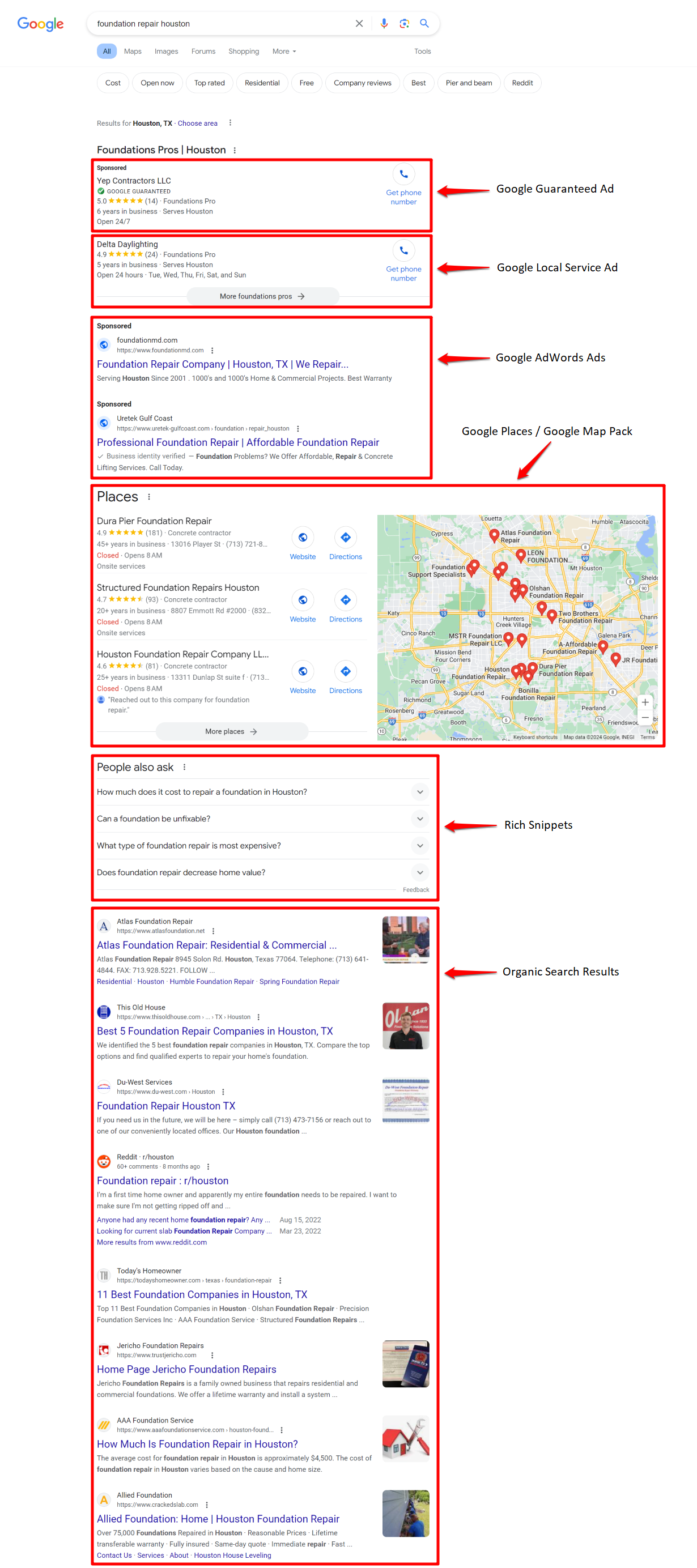
Examples of Google Search Engine Result in Houston, TX
Ranking Factors for SEO for Contractors
To succeed in Search Engine Optimization, there are two high-level “buckets” that all the ranking factors can be grouped into:
- On-Page SEO – this is everything done to affect what’s on your website.
- Off-Page SEO – these are all the SEO activities that happen outside your website
Breaking it down further on how to rank a contractor’s website, there are multiple steps and key ranking factors that you and your team should focus on:
- Keyword Research: Identify short-tail and long-tail keywords that potential customers use to find contractor services
- Content Marketing: Design a content plan that creates a roadmap for high-quality, informative content that addresses your target audience’s search needs and develops your website into an authority on your subject
- On-Page SEO: Make sure each webpage is fully optimized to more easily rank higher in search results, this includes updating page titles, meta descriptions, H1/H2/H3 titles, and technical on-page SEO
- Local SEO: Optimize your Google Business Profile to target customers customers in your specific geographical area
- Link Building: Acquire high-quality backlinks from reputable websites to improve your website’s authority and credibility
- Monitoring and Adjusting SEO Results: Tools and tips to track your results over time, and how to stay ahead of your competition and Google
In each of the next six sections, we’ll take a deeper dive to learn how you can rank your website…
Deeper Dive: Key Ranking Factors of a Successful Contractor SEO Strategy
A successful local SEO strategy involves several key ranking factors that work together to improve your website’s visibility and attract more qualified customers.
Let’s explore these six ranking factors in a bit more detail…
1. How do you do Keyword Research for Contractor SEO?
Keywords are the search terms that a person enters into a search engine when they begin their search.
Identifying the right keywords is the foundation to any successful and effective SEO campaign.
With local SEO, you need to know where your customer is searching (location), why they are searching (researching or buying), and what service they are looking for.
Knowing that, keywords can be broken out into two types:
- Short-tail keywords
- Long-tail keywords
Short-tail keywords are the high-volume keywords, like ‘foundation repair.’ These are the types of keywords that people start out with to begin their research process. While they might have some buying intent, their primary focus is to begin looking and figure out what they are looking for.
Generally as the process moves along, people will get more refined in the search process and begin to add more words to their keyword, creating longer search terms. For example, after a little bit of research, they might search for ‘slab jacking foundation repair contractor near me‘ – keywords like these are called long-tail keywords. While search volume for these types of keywords are lower, they are valuable to target, since the buying intent is much higher and would convert much easier to a phone call or email to your business.
Keyword Research Tools
There are some incredible tools out there that make it easy to find keyword ideas, and search volume, like Google Keyword Planner.
Additionally, there’s important SEO tools like SEMrush, which is a paid SEO research tool that lets you do extensive keyword research, learn what keywords drive the most paid and organic traffic, lets you research your competitors and see what keywords they’re ranking for, and quite a few others things too – including many great non-keyword research tools too.
Here’s an overview video of the full capabilities and features of SEMrush:
Conclusion
Keyword research is an important foundation for an SEO campaign for contractors. By knowing where, why, and what your customers are searching for, you can find the best keywords. Short-tail keywords get broad interest, while long-tail keywords have higher buying intent and are more likely to convert into leads. Tools like Google Keyword Planner and SEMrush help you find good keywords, check search volumes, and see what your competitors are doing. This boosts your SEO efforts and brings more qualified traffic to your business.
2. Content Marketing for Contractors: Building your website into an Authority
Content marketing is a key part of SEO for contractors – you want to show Google that you are the authority on the subject. This helps improve your search engine rankings and shows Google that your business is trustworthy and knowledgeable.
Here are some simple ways to use content marketing for your contracting business.
Write Detailed Services Pages
Creating detailed service pages, with a clear site structure in mind, is very important to let visitors (and Google) know what services your business offers.
There should be general service pages that has an overview of all the major services, webpages for each of those main services, then webpages for each of the subservices – think of it as a three level pyramid.
For this example, this would be for a foundation repair company. There would be a main Services page, then under that:
- Foundation Repair: Talk about common foundation problems, what signs to look for, and a high-level overview on the different types of foundation repair. Include information about your experience and what past customers say about you
- Subpages: You would cover each separate foundation repair service in a bit more detail on it’s own webpage. For example, the subpages could be on services such as helical piers, concrete piers, anchor foundation repair, etc…
- Basement Waterproofing: Explain why basement waterproofing is important and the different methods you use. Share success stories or reviews from happy clients
- Subpages: Here you can have subservices webpages that covers each of the different types of basement waterproofing services, such as interior, exterior, and drainage
- Concrete Leveling: Describe why uneven concrete is a problem, how you fix it, and why your method is the best. Show before-and-after photos to prove it works
- Subpages: Here you can have separate subservice webpages for each of the different types of concrete leveling services you provide, such as stone slurry grout leveling, foam concrete leveling, mudjacking, etc…
- Foundation Repair: Talk about common foundation problems, what signs to look for, and a high-level overview on the different types of foundation repair. Include information about your experience and what past customers say about you
By creating these detailed service pages, you give potential customers all the information they need to trust your expertise and choose your company.
Blog Posts on Maintenance Tips, Industry Trends, and DIY Guides
Updating your blog with helpful posts can boost your SEO and show that you are a leader in your field. Here are some blog ideas:
- Foundation Maintenance Tips: Share easy tips on how homeowners can take care of their homes to prevent problems
- Industry Trends: Write about the latest trends in your specific industries, like new technologies, materials and methods. This shows that your business stays current and uses the best practices
- DIY Repair Guides: Offer simple guides for small DIY repairs that homeowners can do themselves. Giving free advice builds trust and shows you know your stuff. When bigger problems come up, these readers are likely to call you for help
Case Studies Showing Successful Projects
Case studies are a great way to show your expertise and the good results of your projects. A good case study should include:
- Background Information: Describe the problem at the project site and what the client wanted
- Challenges: Explain any problems you faced during the project and how you solved them
- Solutions and Techniques Used: Detail the methods you used to fix the issues. This shows your skills and knowledge
- Results: Highlight the positive outcomes, like better structural integrity and happy customers
Including quotes or a short video from satisfied clients can make your case studies even more convincing.
Infographics Explaining Construction or Repair Techniques
Infographics are a fun and easy way to share complex information. Use infographics to:
- Explain Construction or Repair Techniques: Show different construction or repair methods for your particular trade, how construction or repairs work, and the benefits of each one. For example, if there are separate methods or materials for a project, you can create an infographic that compares them all. For example, it could be an infographic companies the different types of roof materials, e.g. shingles, tiles, metal, etc…
- Showcase Benefits: Highlight the benefits of keeping a healthy home, whether it’s parts of the exterior or interior, and how proper maintenance will likely increase property value and improve home safety
- Educational Content: Create infographics that explain common problems, what causes them, and how to fix them
Videos Showing DIY Repairs or Highlighting Your Team’s Expertise
Videos are engaging and can help show your skills and connect with your audience. Consider making:
- DIY Repair Videos: Create short videos that show viewers how to do simple repairs or maintenance tasks. This can help build trust and show that your business is helpful
- Project Showcases: Make videos that highlight your completed projects. Show before-and-after footage, interview happy clients, and explain what you did. This proves your skills and quality
- Expert Interviews: Feature interviews with your team members or other experts discussing topics related to your trade. This can make your brand more relatable and show that your business is knowledgeable. If you’ve been on a podcast and they filmed it, video clips from that would work great!
Conclusion
By using these content marketing strategies, you can improve your SEO, show your website is an “authority” to Google, engage your audience, and establish your contracting business as a leader in the industry. Providing valuable, easy-to-understand content will help attract potential clients and build strong relationships.
3. Importance of On-Page SEO Optimization for Local Contractors
Once you have your target keywords, it’s time to optimize your website’s content and structure to align with those keywords.
On-page SEO and technical optimization are important for improving your website’s search engine rankings and making sure visitors have a good experience. Once you have found your target keywords, it’s time to optimize your website’s content and structure to match those keywords.
If you use WordPress to build your website, a great SEO plug-in that helps optimize some of the on-page SEO is All In One SEO WordPress plug-in.
Here’s how to do start optimizing your on-page SEO, and what to keep an eye out for…
Use Keywords Naturally
Using your target keywords the right way is key for on-page SEO. Here’s how to do it:
- Page Titles: Make sure each webpage title includes your main keyword you’re targeting for that page. For example, if your keyword is “foundation repair” for your Foundation Repair service page, a good webpage title might be “Foundation Repair Services in [Your City].” Keep titles short and to the point so that they show up properly in Google Search Results.
- Meta Descriptions: Write a good meta description that includes your keyword. This description shows up in search results, so it should be clear and make people want to click. For example, “Professional foundation repair services in [Your City]. Fast, reliable, and affordable solutions for your home.”

Examples of Page Title and Meta Description
- Heading Tags: On your webpage’s content, use your target keywords in the different headings (H1, H2, H3). Your main heading (H1) should have the main keyword, and subheadings can include variations and related terms. This helps search engines understand the page’s content structure correctly.
- Body Content: Use your keywords naturally in the body content. Don’t overuse them. Aim for a keyword density of about 1-2%. Use variations and related terms to keep the content interesting and relevant.
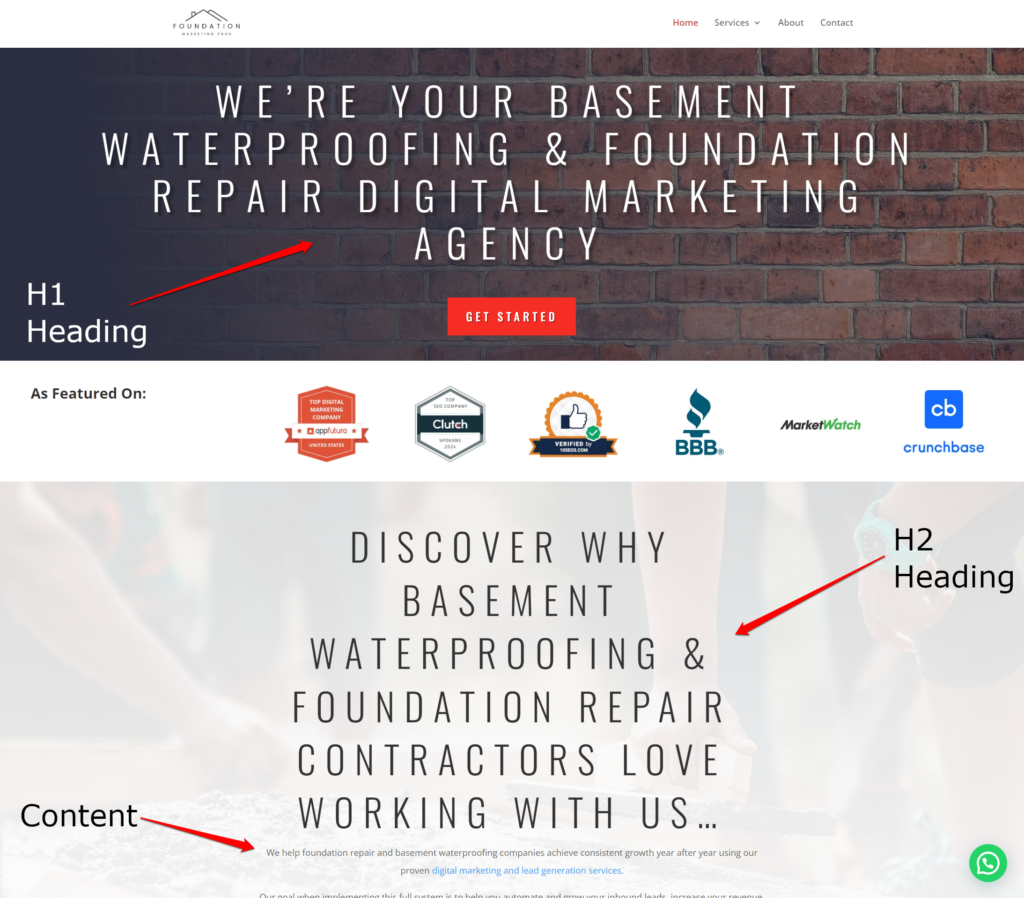
Examples of Headings and Body Content
A well-organized website is important for both users and search engines. Here are some tips:
- Clear Hierarchy: Organize your content in a logical way. Use categories and subcategories to group related pages. For example, under “Services,” you might have subcategories like “Foundation Repair,” “Basement Waterproofing,” and “Concrete Leveling.”
- Internal Linking: Use internal links to connect related pages. This helps users navigate your site and helps search engines understand the relationships between pages. For example, if you mention basement waterproofing in a blog post about foundation repair, link to your basement waterproofing service page.
- Breadcrumbs: Use breadcrumb navigation to show users their location on your site. This helps with navigation and improves the user experience. Breadcrumbs also provide additional internal links for search engines.
Optimize Images
Images make your content better but can slow down your website if not optimized properly. Here’s how to optimize your images:
- Descriptive Alt Tags: Use descriptive alt tags that include your keywords. Alt tags help search engines understand the content of the images and improve accessibility for visually impaired users. For example, for an image showing a foundation repair process, an alt tag might be “Contractor performing foundation repair in [Your City].”
- File Names: Use descriptive file names for your images before uploading them. Instead of “IMG1234.jpg,” use “foundation-repair-service.jpg.” This practice helps search engines index your images better.
- Image Compression: Compress images to reduce their file size without losing quality. This helps improve page load speed. Tools like TinyPNG or JPEG-Optimizer can help with this.
Improve Page Load Speed
Page load speed is important for both SEO and user experience. Slow-loading pages can lead to higher bounce rates and lower rankings. Here’s how to improve your page load speed:
- Optimize Code: Minimize CSS, JavaScript, and HTML code. Removing unnecessary spaces, commas, and characters can help. Tools like Minify Code can assist with this.
- Enable Browser Caching: Browser caching stores some of your site’s files on visitors’ browsers, so they don’t have to download everything again on their next visit. This speeds up page loading times for returning visitors.
- Use Content Delivery Networks (CDNs): CDNs distribute your content across multiple servers around the world, reducing the distance between the server and the user. This helps improve load speed.
- Google’s Site Speed Tool: Use Google’s PageSpeed Insights tool to analyze your site’s performance and get specific recommendations for improvement. You can access it here: Google PageSpeed Insights.
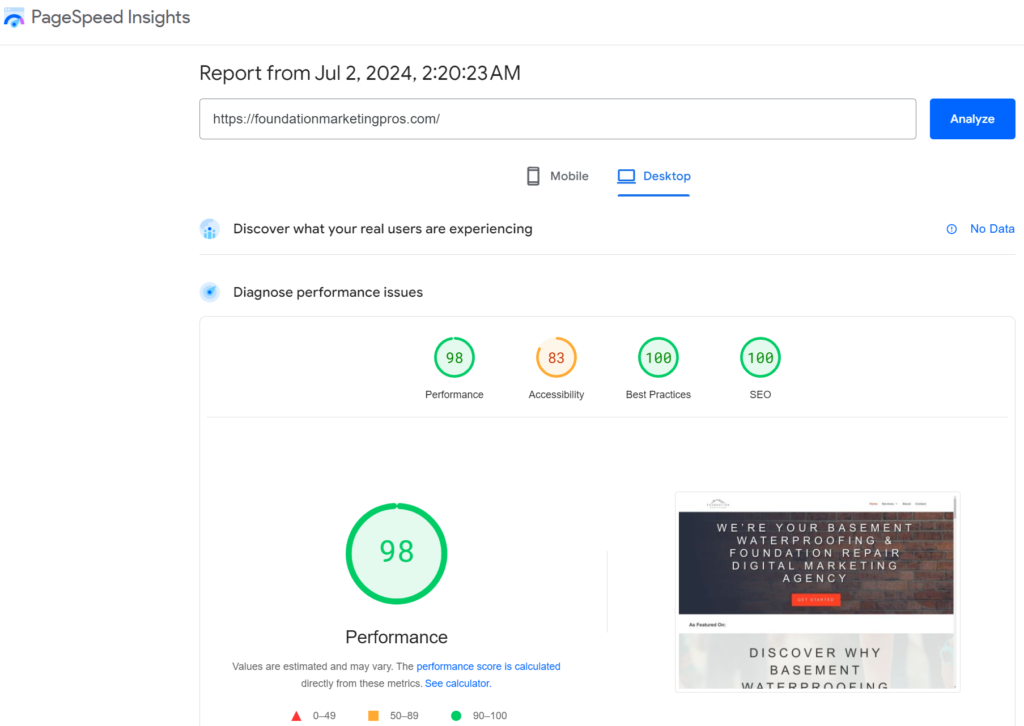
Example of Google PageSpeed Insights
Ensure Mobile-Friendliness
With more people using mobile devices to browse the internet, having a mobile-friendly website is crucial. This really comes down to the web design (or best WordPress theme) and high-speed hosting – with the best for both, your mobile web experience will be awesome for your visitors, which Google will love.
Google also uses mobile-first indexing, which means it primarily uses the mobile version of a site for ranking and indexing. Here’s how to ensure your site is mobile-friendly:
- Responsive Design: Use a responsive design that adjusts to different screen sizes. This ensures your website looks good on desktops, tablets, and smartphones.
- Mobile-Friendly Test: Use Google’s Mobile-Friendly Test tool to check if your website is optimized for mobile devices. It provides insights and suggestions for improvement.
- Simplify Navigation: On mobile devices, navigation should be simple and easy to use. Use a clean, straightforward layout with easily clickable buttons and links.
- Optimize Touch Elements: Make sure buttons and touch elements are large enough and spaced properly to prevent mis-clicks.
Conclusion
On-page SEO optimization is essential for any contractor’s website. By using your target keywords correctly, you can make your website more visible in search results. This means more people will find your services when they need them. Tools like the All In One SEO WordPress plugin can help you optimize your site effectively.
A well-structured and easy-to-navigate website ensures visitors have a good experience. Optimizing images, improving page load speed, and making sure your site is mobile-friendly are all crucial steps. These efforts not only improve your search engine rankings but also attract and retain more customers for your foundation repair and basement waterproofing business. Remember, SEO is an ongoing process, so keep reviewing and updating your strategies to stay ahead.
4. Local SEO for Contracting Companies
Local SEO is essential for foundation repair and basement waterproofing companies. When people in your area search for these services, you want your business to show up first. One of the best ways to achieve this is by optimizing your Google Business Profile and other local listings. Here’s how to do it:
Claim and Verify Your Listing
The first step in optimizing your Google Business Profile is to claim and verify your listing. Here’s how:
- Claim Your Listing: Go to Google Business and search for your business. If it appears, claim it. If not, you can create a new listing.
- Verify Your Listing: Google will send you a postcard with a verification code to your business address. Enter this code into your Google My Business account to verify your listing. Verification helps ensure that your business is legitimate and allows you to manage your profile.
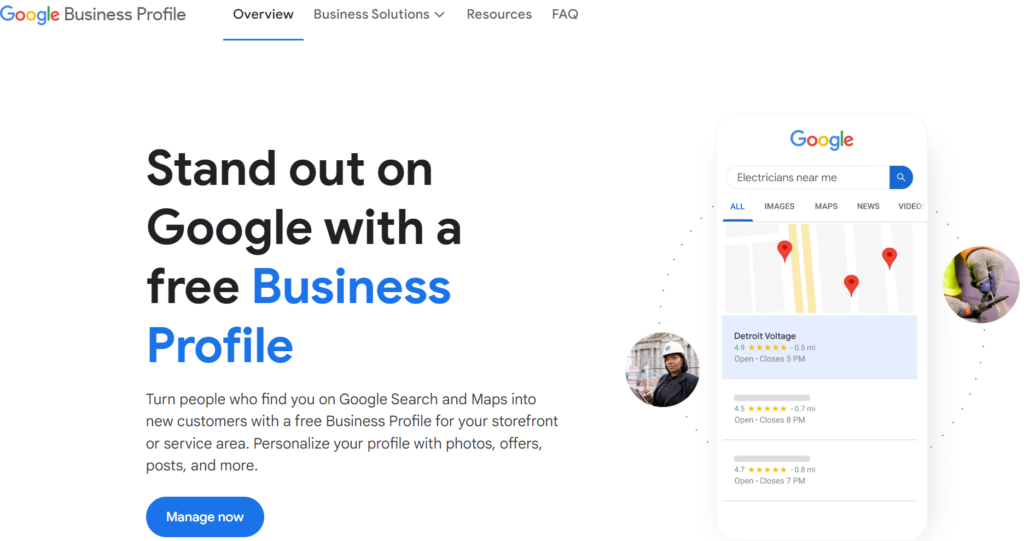
“Google Business Profile” home page
Complete All Relevant Sections
Once your listing is claimed and verified, fill out all relevant sections. A complete profile helps customers find important information about your business and improves your search ranking. Here’s what to include:
- Business Name: Use your official business name. Avoid adding extra keywords or location information here.
- Business Hours: Enter your regular business hours. Update these hours for holidays or special events.
- Services: List all the services you offer, such as foundation repair, basement waterproofing, and concrete leveling. Be specific to help potential customers understand what you do.
- Service Area: Define the geographic areas you serve. This helps people in nearby locations find your business.
- Contact Information: Make sure your phone number, email address, and website are correct. Consistent contact information helps customers reach you easily.
Add High-Quality Photos
Photos are a great way to showcase your work and make your profile more attractive. Here’s how to use photos effectively:
- Work Examples: Upload before-and-after photos of your foundation repair and basement waterproofing projects. This demonstrates the quality of your work.
- Team Photos: Include photos of your team at work. This helps personalize your business and build trust with potential customers.
- Business Location: If you have a physical location, add photos of your office or storefront. This makes it easier for customers to recognize your business.
Encourage Satisfied Customers to Leave Reviews
Positive reviews can greatly enhance your business’s reputation and improve your local SEO. Here’s how to encourage customers to leave reviews:
- Ask for Reviews: After completing a job, ask your satisfied customers to leave a review on your Google Business Profile. You can do this in person, via email, or through a follow-up phone call.
- Make It Easy: Provide a direct link to your review page. You can include this link in your email signature, on your website, or in invoices.
- Respond to Reviews: Thank customers for positive reviews and address any negative feedback politely and professionally. Responding to reviews shows that you value customer feedback and are committed to improving your services.
Regularly Post Updates and Special Offers
Keeping your Google Business Profile updated with the latest news and offers can attract more customers. Here’s what to post:
- Updates: Share news about your business, such as new services, changes in business hours, or company milestones.
- Special Offers: Promote discounts, seasonal offers, or special promotions. For example, you might offer a discount on basement waterproofing services during the rainy season.
- Events: If you’re hosting or participating in local events, share this information on your profile. This can increase community engagement and attract local customers.
Create Listings on Other Local Citation Websites
In addition to Google My Business, it’s important to create listings on other local citation websites. This helps improve your online presence and makes it easier for customers to find you. Here are some key sites to consider:
- Yellow Pages: Create a listing on Yellow Pages to reach customers looking for local businesses.
- Facebook: Set up a business page on Facebook. Regularly post updates and engage with followers to build a community around your brand.
- Yelp: Create a profile on Yelp and encourage satisfied customers to leave reviews. Respond to reviews to show that you value customer feedback.
- BBB (Better Business Bureau): A BBB listing can enhance your business’s credibility. Maintain a good rating by providing excellent customer service.
- Local Directories: There’s hundreds+ of other similar websites to post a local citation. The easiest way to find them in the contracting industry is to do a Google search for it, such as “best local citations for a foundation repair company.” Consistent listings across multiple sites will help improve your local SEO.
Maintain Consistent NAP Information
Consistency is key when it comes to local SEO. Make sure your business name, address, and phone number (NAP) are the same across all listings. Inconsistent information can confuse search engines and potential customers, negatively affecting your rankings.
Optimize for Local Keywords
Include local keywords in your website content, Google Business Profile, and other listings. For example, use phrases like “foundation repair in [Your City]” or “basement waterproofing services near [Your City].” Local keywords help search engines understand your service area and improve your chances of appearing in local search results.
Monitor and Analyze Your Performance
Regularly monitor your Google Business Profile and other local listings to track your performance. Use Google My Business Insights to see how customers find your profile, what actions they take, and how many calls or website visits you receive. Analyzing this data can help you understand what’s working and where you can improve.
Conclusion
Optimizing your Google Business Profile and other local listings is essential for contractors. By claiming and verifying your listing, completing all relevant sections, adding high-quality photos, encouraging reviews, posting updates, and maintaining consistent information across multiple platforms, you can improve your local SEO and attract more local customers. Regularly monitor your performance and make adjustments as needed to stay ahead of the competition and grow your business.
5. SEO Link Building for Contractors
Link building is a crucial part of SEO (Search Engine Optimization). It involves getting other websites to link to your website. These links, called backlinks, help search engines like Google know that your website is trustworthy and important.
High-quality backlinks can significantly boost your website’s authority and search engine rankings.
Here’s how to do link building correctly and why it’s important to avoid mistakes.
Why Link Building is Important
Backlinks are like votes of confidence from other websites. When reputable websites link to your site, it tells search engines that your content is valuable. This can help you rank higher in search results, making it easier for people to find your business when they search for foundation repair or basement waterproofing services.
How to Generate High-Quality Backlinks
Guest Posting on Industry Blogs or Local Business Websites
One effective way to get backlinks is by writing guest posts for other blogs or websites. Here’s how:
- Find Relevant Blogs: Look for blogs related to foundation repair, basement waterproofing, or home improvement. Local business websites in your area are also good targets.
- Reach Out: Contact the blog owners and offer to write a guest post. Make sure your content is useful and relevant to their audience.
- Include a Link: In your guest post, include a link back to your website. This not only helps with SEO but also drives traffic to your site.
Participating in Online Forums and Communities
Engaging in online forums and communities can also help you build backlinks. Here’s how:
- Join Relevant Forums: Find online forums and communities related to your industry. Look for ones that discuss foundation repair, basement waterproofing, or general home improvement.
- Contribute Helpfully: Answer questions, provide helpful advice, and share your expertise. Don’t just drop links to your website; make sure your contributions are valuable.
- Include Links When Appropriate: When it makes sense, include a link to your website. For example, if someone asks about basement waterproofing techniques, you can link to a detailed guide on your site.
Partnering with Local Businesses or Organizations
Partnering with other local businesses or organizations can be a great way to get backlinks. Here’s how:
- Find Partners: Look for local businesses or organizations that complement your services. For example, you could partner with a local home improvement store or a real estate agency.
- Propose a Partnership: Suggest ways you can work together, such as cross-promoting each other’s services or hosting a joint event.
- Link Exchange: Offer to link to their website in exchange for them linking to yours. This can benefit both businesses by increasing visibility and authority.
Creating Valuable Resources
Creating valuable resources that other websites want to link to is another effective link-building strategy. Here’s how:
- Write Guides and How-To Articles: Create detailed guides and how-to articles about foundation repair, basement waterproofing, or related topics. Make sure your content is thorough and helpful.
- Conduct Research: Conduct research or surveys related to your industry and publish the results. Other websites may link to your research as a valuable resource.
- Create Infographics: Design informative infographics that explain complex topics in an easy-to-understand way. Infographics are often shared and linked to by other websites.
The Impact of Google’s Algorithm Updates
Google frequently updates its algorithm to improve the quality of search results. These updates can have a big impact on your website’s rankings, especially if you’re not building links correctly. Here’s why:
Quality Over Quantity
Google’s algorithm updates prioritize the quality of backlinks over quantity. This means that having a few high-quality backlinks from reputable sites is better than having many low-quality links. If your site has too many low-quality or spammy links, Google might penalize it, causing your rankings to drop.
Relevance Matters
Google also looks at how relevant the backlinks are to your content. Links from sites related to foundation repair, basement waterproofing, or home improvement are more valuable than links from unrelated sites. If your backlinks come from irrelevant sources, your site’s authority might decrease.
Natural Link Building
Google wants to see natural link building. This means your backlinks should come from genuine mentions and recommendations, not from buying links or using other manipulative tactics. If Google detects unnatural link-building practices, your site could be penalized.
How to Avoid Google SEO Penalties
To avoid penalties from Google’s algorithm updates, focus on earning natural, high-quality backlinks. Here’s how:
- Avoid Buying Links: Don’t buy links from other websites. These links are often low-quality and can lead to penalties.
- Steer Clear of Link Farms: Link farms are websites created solely for link building. Links from these sites are low-quality and can harm your rankings.
- Check Your Backlinks: Regularly check your backlink profile using tools like Google Search Console. If you find low-quality or spammy links, disavow them to avoid penalties.
- Focus on Quality Content: Create high-quality, valuable content that naturally attracts backlinks. This is the best way to build a strong, penalty-free backlink profile.
Conclusion
Link building is a powerful tool for improving your website’s SEO and attracting more customers. By generating high-quality backlinks from reputable websites, you can boost your site’s authority and search engine rankings. Focus on earning natural, relevant links through guest posting, participating in online forums, partnering with local businesses, and creating valuable resources.
Be aware of Google’s algorithm updates and avoid practices that can lead to penalties. Prioritize quality over quantity, ensure your backlinks are relevant, and focus on natural link-building strategies. By doing so, you can build a strong online presence and grow your foundation repair and basement waterproofing business.
6. Monitoring and Adjusting Your Contractor SEO Results Over Time
To make sure your SEO efforts are working well, you need to monitor and adjust your strategies regularly. This means keeping an eye on how your website is performing and making changes when needed. Here’s how you can do it.
Use SEO Tools to Results of Your Local SEO Campaign
There are several tools that can help you track your local SEO performance. Some of the best ones are Google Analytics, Google Search Console, Serpple, and LocalFalcon. Cumulatively, they will tell you what keywords your website is ranking for, where you received visitors from, if they converted to a lead, and much more.
Let’s look at what these tools can do for you.
Google Analytics
Google Analytics is a tool that helps you see how people use your website. It shows you how many visitors come to your site, where they come from, and what pages they visit. You can see how long they stay on your site and if they become customers. Google Analytics also helps you track how well your website is doing in search engines, and it gives you lots of useful information to help you make your site better.
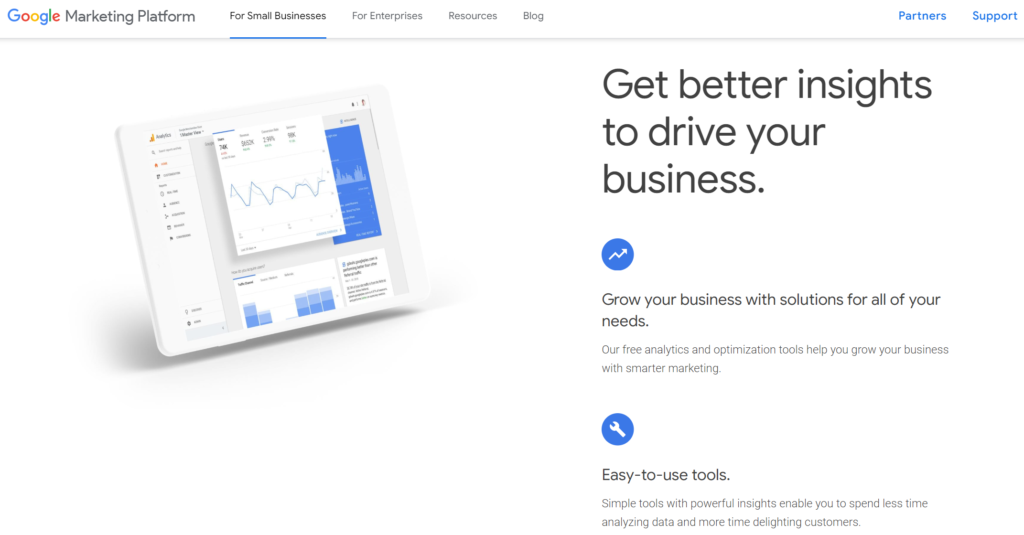
“Google Analytics” home page
Google Search Console
Google Search Console is a tool that helps you see how your website shows up in Google search results. It tells you which keywords people use to find your site, how high your site ranks for those keywords, and how often people click on your site from the search results. You can also find out if there are any problems with your site, like broken links or errors. Google Search Console helps you make your website better and easier for people to find.
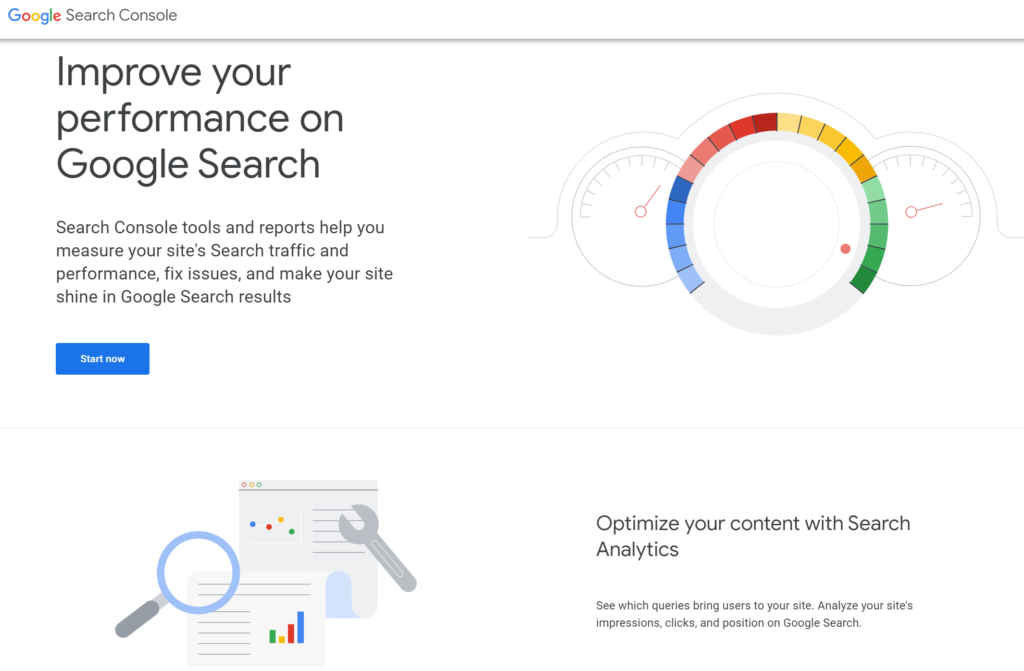
“Google Search Console” home page
Serpple
Serpple is a rank tracker tool. It helps you see where your website ranks in search results for specific keywords, even for specific cities. This is a very useful for tool to track the results of your SEO campaign over time.
“Serpple” home page
LocalFalcon
LocalFalcon is another rank tracker tool, but it focuses on local search results in Google Maps, where it shows how your website ranks in Google Maps block-by-block, which is very important for local businesses.
“LocalFalcon” home page
Key Metrics to Monitor
When using these tools, there are some key metrics you should keep an eye on:
- Organic Traffic: The number of visitors coming from search engines.
- Keyword Rankings: Where your website appears in search results for specific keywords.
- Click-Through Rates (CTR): How often people click on your site in the search results.
- Conversion Rates: The percentage of visitors who become leads or customers.
Identify Areas for Improvement
Once you have the data from these tools, use it to identify areas where you can improve. Here are some questions to ask:
- Is Organic Traffic Increasing?: If your traffic is not increasing, you may need to improve your content or get more backlinks.
- Are Your Keyword Rankings Improving?: If not, you might need to adjust your keyword strategy.
- Is Your CTR High?: If people are not clicking on your site, you may need to improve your meta descriptions and titles to make them more appealing.
- Are Your Conversion Rates Good?: If not, look at your website’s user experience and make it easier for visitors to become leads.
Adjust Your Local SEO Strategy
Based on the data you collect, make adjustments to your SEO strategy. Here are some tips:
- Improve Content: Make sure your content is high-quality and relevant to your audience. Use the keywords you want to rank for naturally in your content.
- Build Backlinks: Try to get more high-quality backlinks from reputable sites.
- Optimize Meta Descriptions and Titles: Make sure they are clear and enticing to encourage clicks.
- Enhance User Experience: Make your website easy to navigate and ensure it loads quickly.
Regular Monitoring
SEO is not a one-time task. It’s important to monitor your performance regularly. Set aside time each month to review your data and make necessary changes. This will help you stay on top of your SEO efforts and continue to improve your website’s performance.
Conclusion
Keeping track of your contractor SEO results over time is very important. By using tools like Google Analytics, Google Search Console, Serpple, and LocalFalcon, you can see how your website is doing. These tools help you check things like how many people visit your site from search engines, how your keywords are ranking, how often people click on your site, and how many visitors become customers.
Use this information to find ways to get better. You can improve your content, get more backlinks, and make your titles and descriptions more attractive. Regularly checking and updating your SEO strategy helps you keep doing well, bringing more visitors to your foundation repair and basement waterproofing business and turning them into customers.
What Our Clients Say About Us
“It’s one thing to hire a marketing firm to manage your online and social media campaigns; it is another to bring on board a marketing advisor. Tom has a commanding knowledge of SEO and social media campaigns and is able to break the concepts down to a level I can understand. Likewise, Tom not only explains the “how” of the campaign, but also the “why” and accurately projects the amount of leads in a 3-6-9 month periods within my industry, all of which are uncanny abilities. Similarly, I always look forward to his monthly updates via video – in my opinion its much better than reading a report.
“Tom is an integral part of my marketing team, and I look to him to formulate the strategic and tactical methodologies of my practice’s marketing vision. I look forward to a very long term relationship with Tom. “
“Tom is absolutely amazing! He helped me get so many new leads for both home buyers and sellers in just 60 days. I was feeling really overwhelmed before, but now I’m feeling so much more confident and excited about my work now that I can rely on the follow-up automations. Tom really knows what he’s doing and they’re super easy to work with. I can’t thank them enough for all their help! I would definitely recommend them to anyone who needs help to grow their business.“
“Tom has been a breakthrough for our catering business in West Seattle. Thanks to their SEO services, we’ve seen a steady increase in website traffic and business growth over the years we’ve used them. We’re dominating the West Seattle neighborhood and even ranking for super high-volume Seattle search keywords too. Since our website traffic (and sales) has increased substantially, and we bought an event space and another catering company south of Seattle. Tom’s digital marketing expertise has been invaluable to our success, and we can’t thank them enough for their dedication and hard work. We highly recommend their services to any business that’s looking to expand.“
“Tom is my marketing powerhouse for my real estate investing company. Their digital marketing magic has landed me multiple distressed investment properties to purchase, boosting my bottom line big time! Their personalized touch and attention to detail make working with them a breeze. If you’re serious about growing your company, these guys are the real deal!“
“In the fist 30 days of working with Tom, my team has been stretched really thin. To be honest, they’re also a bit stressed by all these new appointments. Though, we’re all incredibly happy to get over 60 new long-term patients in the the 30 days!”
“Hiring Tom was a complete game-changer for my roofing company! I hired him for a very cost effective marketing campaign that brought in $100’s of thousands in revenue for my roofing company. We were blown away by the ROI and the results for new roofs, and I can’t thank him enough for his expertise. We highly recommend him to every business looking for a ROI-focused way to boost their sales long term.“




